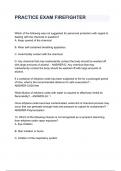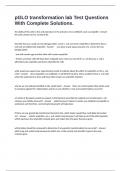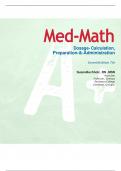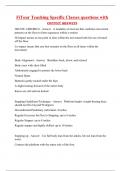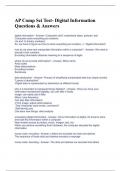LECTURE 1
1.1 FUNCTION OF FINANCIAL STATEMENTS
Problem: firm need money
- Investors can provide money to the firm
Firm can issue shares and investor become a part owner and get dividends
Firm can work with loans (investor is not a owner), they pay back the loan and interests
Informa on asymmetry between management and shareholders/debtholders
- Management knows considerably more about the condi on and the ac vi es of the firm
- Efficient trading is very difficult
Lemon problem: imagine a used car market. The buyer doesn’t know anything about cars, so he take
a look at the average price and that is what the buyer wants to pay. If the seller knows that the car is
underpaid, they will not sell their car at the average price. But if everyone don’t want to sell at that
price, the average price will go down. The market will follow this dynamic, but that is not good.
FSMA: Financial Services and Markets Authority --> financial regulator body in Belgium
- Firms: give more informa on to show that they are healthy and that there will be profit
- Financial statements: part of it is mandatory and part is voluntary
Core of everything + mandatory + checked
- Regulators tells you how to report (make it comparable)
- Auditors: independent ins tu ons: make sure all rules from regulators are followed
- Analysts: look at financial statements and based on it they make an investment
recommenda on
- Informa ve for
Trading partners: suppliers who you want to know if they can be
Employees: trade unions
Prospec ve members from above
Regulators: use it to make new rules
Third par es
1.2 OUR ROLE: EXTERNAL ANALYIST
- Credit analyst: interested in liquidity and solvency in short term --> to value debt
- Equity analyst: interested in profitability (long term) --> value crea on
- Value of the firm: value of debt + value of equity
1.3 EQUITY ANALSIS
- Market capitaliza on: current price of a stock x amount of stock outstanding
Higher than book value
- Value of equity ≠ book value of equity
1
, - Value of the equity = market value of the equity
In perfectly efficient markets because all the informa on is ‘priced in’
- CAPM = capital asset pricing model
= risk free rate + beta x (risk premium – risk free rate)
CAPM: 𝑅 = 𝑅 + 𝛽 (𝑅 − 𝑅 )
- ‘Abnormal returns’ are possible through careful analysis of the available informa on
- Asset value may be misrepresented by accoun ng standards
- Assets may have synergies
- Firm may have unique value crea on poten al (intangible)
- Intrinsic or fundamental value = true value
- Market Premium = Market Value – Book Value
- Price-to-book ra o = Market Value / Book Value
- Intrinsic Premium = Intrinsic Value – Book Value
- Intrinsic Price-to-book ra o = Intrinsic Value / Book Value
1.3.1 BASIC VALUATION TASK
Determine value
- Start with anchor and make adjustments
Challenge: which anchors
1.3.2 FIRST METHOD: COMPARABLES OR MULTIPLES
- Iden fy ‘comparable’ firms
- Iden fy measures that drive valua on
Determine mul ples for these measures based on comparable firms market values
Mul ple: market value firm / value driver
Average values over comparable firms
- Apply mul ples to the measures of the target firm
Value = value driver x mul ple
- P/S = price over sales
- P/E = price over earnings
- P/B = price over book value
- P/C = price over cashflows
Problems
o Find good comparable firms
o Find good measures as mul ples
o Extreme values
o Weigh ng mul ple mul ples and mul ple firms
o Assumes efficient pricing for the comparable firms
O en used for IPO’s, private equity
Advantage: easy, simple to understand and communicate
1.3.3 APPLICATION: SCREENING
- Trading strategy
Buy stocks with low mul ples
Sell stocks with high mul ples
- Screen more than one mul ple
- Popular, fashionable mul ples --> explain past performance well
- Some ac ons (high or low) are happening for a reason, that is why you have to do analysis
2
, - Mul ples: simple to compare
Technical analysis: you have compared the value and you have done some analysis
1.3.4 ASSET BASED VALUATION
- To reflect market value of firm
Market-to-market of exis ng assets
Iden fy omi ed assets
Problems
o Mark-to-market requires a market
o Es ma ng value requires efficient markets
o Synergies (or even discounts)
o Omi ed assets
1.4 FUNDAMENTAL ANALYSIS
- Mul ple depends on the strategy of the firm
Strategic analysis: what is their strategy, value proposi on, how do they make money…
- Business (strategy) analysis
Iden fy key profit drivers and business risks
Analysing a firm’s industry and its strategy to create a sustainable compe ve advantage
Enables the analyst to make assump ons in forecas ng a firm’s future performance
- Accoun ng analysis
Evaluate the degree to which a firm’s accoun ng captures the underlying business reality
- Financial analysis
To use financial data to evaluate the current and past performance
- Prospec ve analysis
Focuses on forecas ng a firm’s future by making predic ons
1.4.1 BUSINESS STRATEGY
Industry analysis
- Compe on among exis ng firms depends on:
Industry growth rate
Concentra on and balance of compe tors
Excess capacity and exit barriers
Degree of differen a on and switching costs
Scale/learning economies and the ra o of fixed to variable costs
- Threat of new entrants depends on:
Scale of the company
First mover advantage
Access to channels of distribu on and rela onships
Legal barriers
- Threat of subs tute products or services
Depends on price and performance of the products or services and on the customer’s
willingness to subs tute
3

